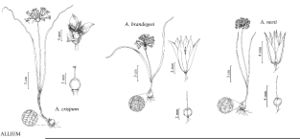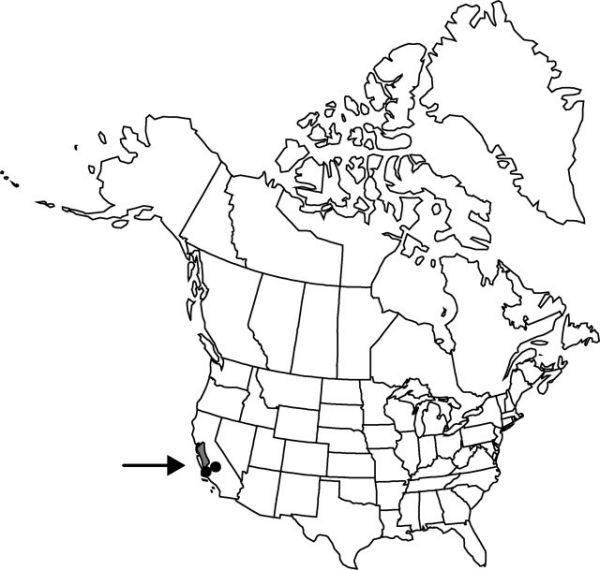Difference between revisions of "Allium crispum"
Pittonia 1: 166. 1888.
FNA>Volume Importer |
imported>Volume Importer |
||
| (6 intermediate revisions by 2 users not shown) | |||
| Line 6: | Line 6: | ||
|place=1: 166. 1888 | |place=1: 166. 1888 | ||
|year=1888 | |year=1888 | ||
| + | }} | ||
| + | |special_status={{Treatment/ID/Special_status | ||
| + | |code=F | ||
| + | |label=Illustrated | ||
| + | }}{{Treatment/ID/Special_status | ||
| + | |code=E | ||
| + | |label=Endemic | ||
}} | }} | ||
|basionyms= | |basionyms= | ||
| Line 11: | Line 18: | ||
|name=Allium peninsulare var. crispum | |name=Allium peninsulare var. crispum | ||
|authority=(Greene) Jepson | |authority=(Greene) Jepson | ||
| + | |rank=variety | ||
}} | }} | ||
|hierarchy=Liliaceae;Allium;Allium crispum | |hierarchy=Liliaceae;Allium;Allium crispum | ||
| Line 26: | Line 34: | ||
|elevation=100–800 m | |elevation=100–800 m | ||
|distribution=Calif. | |distribution=Calif. | ||
| − | |discussion=<p>Allium crispum is known only from the inner south Coast Ranges.</p> | + | |discussion=<p><i>Allium crispum</i> is known only from the inner south Coast Ranges.</p> |
|tables= | |tables= | ||
|references= | |references= | ||
| Line 35: | Line 43: | ||
-->{{#Taxon: | -->{{#Taxon: | ||
name=Allium crispum | name=Allium crispum | ||
| − | |||
|authority=Greene | |authority=Greene | ||
|rank=species | |rank=species | ||
| Line 49: | Line 56: | ||
|publication title=Pittonia | |publication title=Pittonia | ||
|publication year=1888 | |publication year=1888 | ||
| − | |special status= | + | |special status=Illustrated;Endemic |
| − | |source xml=https:// | + | |source xml=https://bitbucket.org/aafc-mbb/fna-data-curation/src/2e0870ddd59836b60bcf96646a41e87ea5a5943a/coarse_grained_fna_xml/V26/V26_492.xml |
|genus=Allium | |genus=Allium | ||
|species=Allium crispum | |species=Allium crispum | ||
Latest revision as of 21:15, 5 November 2020
Bulbs 1–3, increase bulbs absent or ± equaling parent bulbs, never appearing as basal cluster, not clustered on stout primary rhizome, ovoid to globose, 0.9–1.5 × 0.9–1.5 cm; outer coats enclosing 1 or more bulbs, brown or gray, prominently cellular-reticulate, membranous, cells arranged in ± vertical rows, forming distinct herringbone pattern, transversely elongate, V-shaped, without fibers; inner coats white, cells obscure, forming distinct herringbone pattern or ± quadrate, transversely elongate, V-shaped. Leaves persistent, withering from tip by anthesis, 2–3, basally sheathing, sheaths not extending much above soil surface; blade solid, subterete or ± channeled, straight to arcuate, 13–30 cm × 1–3 mm, margins entire. Scape persistent, solitary, erect, solid, terete, 15–35 cm × 1–3 mm. Umbel persistent, erect, loose, 10–40-flowered, hemispheric, bulbils unknown; spathe bracts persistent, 2, 4–6-veined, lance-ovate to ovate, ± equal, apex acuminate. Flowers campanulate, 8–13 mm; tepals erect, rose-purple, lance-ovate to broadly ovate, unequal, outer longer and wider than inner, becoming rigid and keeled in fruit, margins of outer tepal entire, inner denticulate and distinctly crisped, apex acuminate, recurved-spreading at tips; stamens included; anthers yellow; pollen yellow; ovary crested; processes 3, central, 2-lobed, minute, margins entire; style linear, equaling stamens; stigma capitate, 3-lobed; pedicel 10–35 mm. Seed coat dull; cells minutely roughened. 2n = 14.
Phenology: Flowering late Mar–Jun.
Habitat: Clay soils, including serpentine
Elevation: 100–800 m
Discussion
Allium crispum is known only from the inner south Coast Ranges.
Selected References
None.

